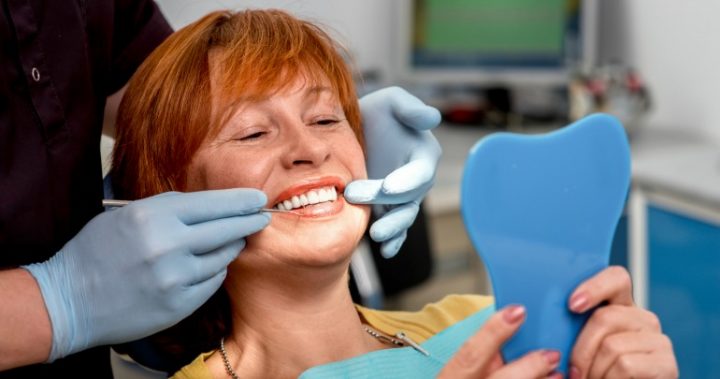Your hormones and how they hit you in the mouth

Hormones are for teenagers you may say, but actually, hormones affect you at every age and every stage of life. Hormonal changes can also have a big impact on oral health for women and men. Here are some of the less well-known side effects of hormones and your mouth health.
Most people know that around the middle years, fluctuations in female hormones such as oestrogen can cause a range of problems before, during and around menopause.
It’s well known that women can become more susceptible to bone problems such as osteoporosis, heart conditions and joint pain; temporomandibular (TMJ) joint pain, which can occur due to decreased oestrogen levels, as oestrogen has an anti-inflammatory effect. However, there are also a number of related oral health problems.
Dry mouth
Dipping and low oestrogen levels affect the amount of water in the body since oestrogen plays a part in controlling fluid regulation — and that includes the fluid content of the mouth. It doesn’t just affect women; lower testosterone levels in men can also cause dry mouth. Even modest forms of low sex hormones, such as testosterone, may impact oral health, (testosterone levels gradually drop by about 1 per cent to 1.5 per cent per year from around the age of 40 or so). Coupling this with the fact that the body’s ability to conserve water naturally declines with age, means that it’s easier to get dehydrated.
Dehydration and contribute to:
What you can do
Drink plenty of water and eat watery foods such as fruits and vegetables, as it may help keep your body — and your mouth hydrated. Keep a glass or bottle with you and sip some throughout the day. Drinking water after a meal also helps to cleanse the mouth, as it boosts the food debris removing action of saliva. But alcohol is a natural dehydrator and can make dry mouth worse. Try to dilute alcoholic drinks with water and enjoy good ol’ H2O or other non-alcoholic alternatives between alcoholic drinks. Chewing sugar-free gum after eating is also a good idea, as it triggers saliva flow helping to cleanse the mouth after eating.
Whatever the cause, if you feel your mouth is dry, see your dentist.
Your dentist may refer you to a specialist to find out the cause as dry mouth and taste changes can be distressing. Reduced saliva production also means that oral problems can worsen because bacteria have more time and opportunity to stay in contact with the teeth, causing damage to both teeth and gums.
Guidance for gums
As oestrogen levels drop in the decade after menopause, women are at greater risk for severe gum disease. Low oestrogen causes inflammatory changes in the body that can lead to gingivitis, a precursor to gum disease and the majority of women — 60 per cent — experience periodontal (gum) problems.
Signs of gum disease include:
What you can do
Keep it clean! The cause of gum disease is the build-up of bacteria between the gums and teeth and this causes irritation, inflammation and bleeding (gingivitis). Cleaning between your teeth is vital. Because the gums are the foundation for your teeth, a weak foundation could even lead to tooth loss.
Gingivitis is not a serious condition. The problem is that it can progress to a more serious form of gum disease, periodontitis. This involves deeper infection and can result in potential tooth loss. Periodontitis is also linked with chronic (long-term) diseases such as heart disease, as bacteria from infected gums pass through damaged gum tissue and enters the bloodstream causing heart problems. This is why it’s vital to keep teeth and gums as healthy as possible not just at home, but with professional dental health check-ups and treatment.
Hormones and bones
The risk of osteoporosis increases rapidly just after menopause and the jawbone, like other bones, can be affected. This is because oestrogen blocks the enzyme that causes bone breakdown.
What you can do
Make sure you get enough calcium and vitamin D. Calcium is the major mineral in bones and teeth, while vitamin D is vital for the absorption of calcium. Foods such as cheese, broccoli and tofu are great sources of calcium and you can get enough vitamin D by going outside and getting some sunlight. This can help to prevent erosion, but it won’t be enough to restore bone loss. Your doctor may prescribe treatment to rebalance your hormone levels if you have severe bone loss- and not just if you’re a woman. Male hormone treatment may also help, so gentlemen, go and see your GP.
Tips to keep your teeth
Wear and tear is natural with age, so protecting your teeth is as vital ever.
Twice daily brushing and flossing are great home maintenance habits, but seeing your dentist for a professional clean and check-up are vital too. Small challenges can be picked up early by your dentist and effective treatments can keep you smiling for the long-term.








 Proudly Australian owned and operated
Proudly Australian owned and operated